Updated 9 months ago
Cheap Solar Panels: Expert Guide to Affordable Solar Panels in 2025
Written by
Jamie Smith
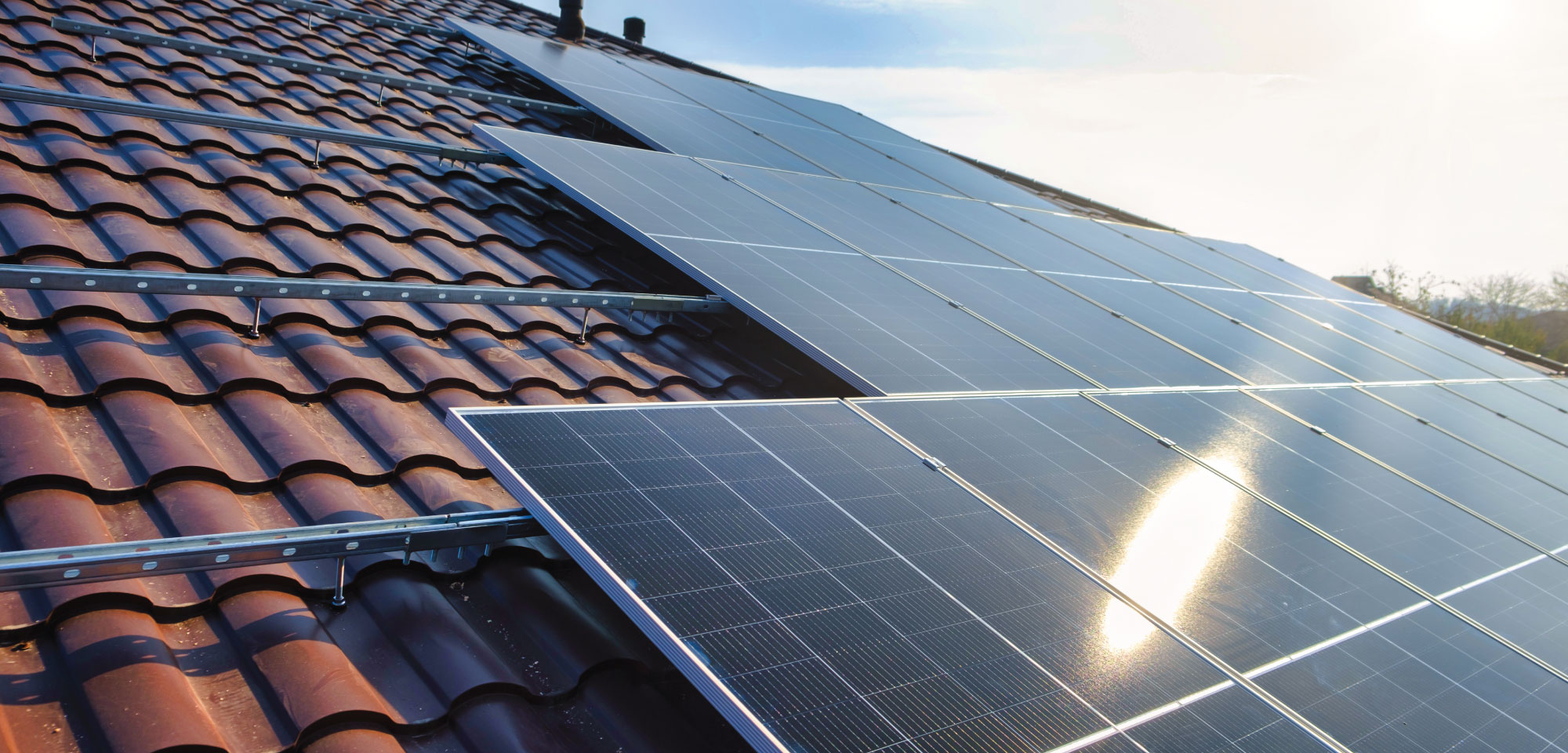
Use this calculator to get solar panels to save an average of $12,000 on a solar installation
One of the biggest barriers to installing solar panels is the significant upfront cost. In 2025, the average price of a solar installation is about $21,816 before any incentives are applied. While this $3.03 per-watt price tag is lower than solar panels have cost in the past, it’s still a significant upfront investment.
Cutting corners can help you save money, but you don’t want to sacrifice quality when it comes to a big investment like a home solar installation. To help narrow your search, we’ve compiled a list of solar panels that come at a low cost per watt, but still check off all the boxes when it comes to good performance. Here are our picks of the best affordable solar panel brands of 2025:
Solar panel brand | Module | Avg. cost (per watt) |
|---|---|---|
VSUN (Vietnam Sunergy) | VSUN460N-96BMHR-D | $2.92 |
HiS-S410YH(BK) | $2.93 | |
JAM54D40-460/LB | $2.94 | |
Vertex S TSM-NEO9RC.05 | $2.95 | |
MSE PERC 108HC | $2.97 |
Top 5 cheap solar panel brands
Our experts reviewed solar panels from reliable brands to find which ones have the best value. Keep in mind, cheap doesn’t always mean good! There may be cheaper modules out there, but the quality would likely be low.
1. VSUN (Vietnam Sunergy): VSUN460-96BMHR-D
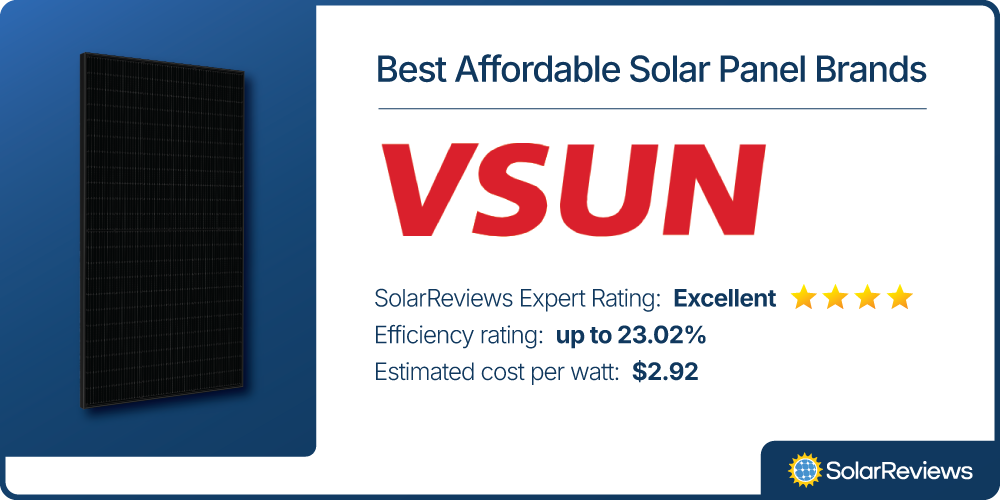
Pros
-
Best value
-
High efficiency
Cons
-
Below-average warranty
Why we chose them: Aside from being the cheapest solar panels on this list, there’s plenty to like about VSUN solar panels. VSUN is cranking out residential solar panels with some of the highest-efficiency ratings in the industry.
You’ll need fewer of these panels on your roof to meet your energy needs, thanks to their 460 W wattage rating, which helps lower your overall solar equipment costs. VSUN’s 12-year product warranty and performance warranty that promises 89.4% operating power after 25 years aren’t breaking any records, but these solar warranties still offer solid protection.
2. Hyundai Energy Solutions: HiS-S410YH(BK)
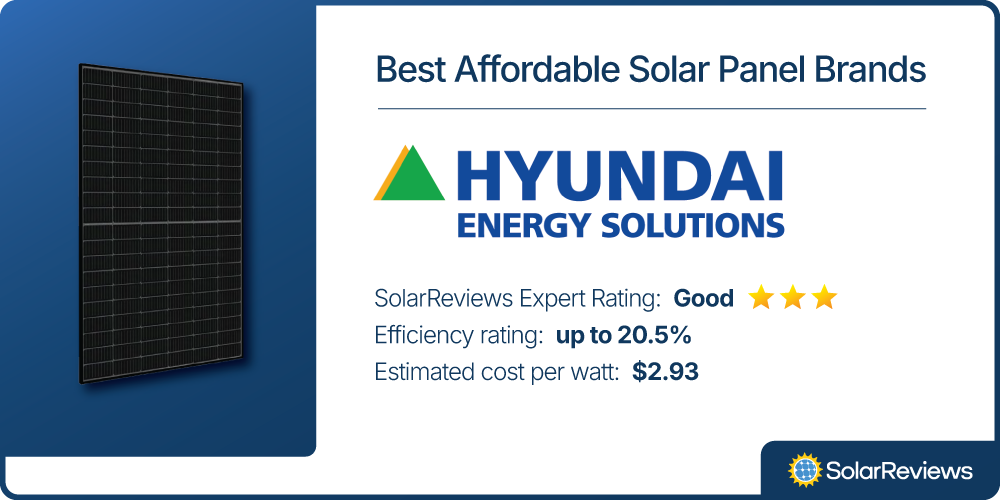
Pros
-
Good warranty
-
Operates well in hot conditions
Cons
-
Degrade faster than competitors
-
Lower efficiency than competitors
Why we chose them: Hyundai Energy Solutions is a solar panel manufacturer based in South Korea and has grown into a global supplier in the solar energy industry. The company’s new YH(BK) panels are monocrystalline bifacial solar panels that are a great, low-cost option for homeowners.
With a 25-year warranty for product and performance, these panels have good coverage for your peace of mind. This module offers efficiency levels of up to 20.5%, which is considered relatively low by today’s standards. Still, when you look at this solar panel as a whole, it remains a solid and reliable option.
3. JA Solar: JAM54D40-460/LB
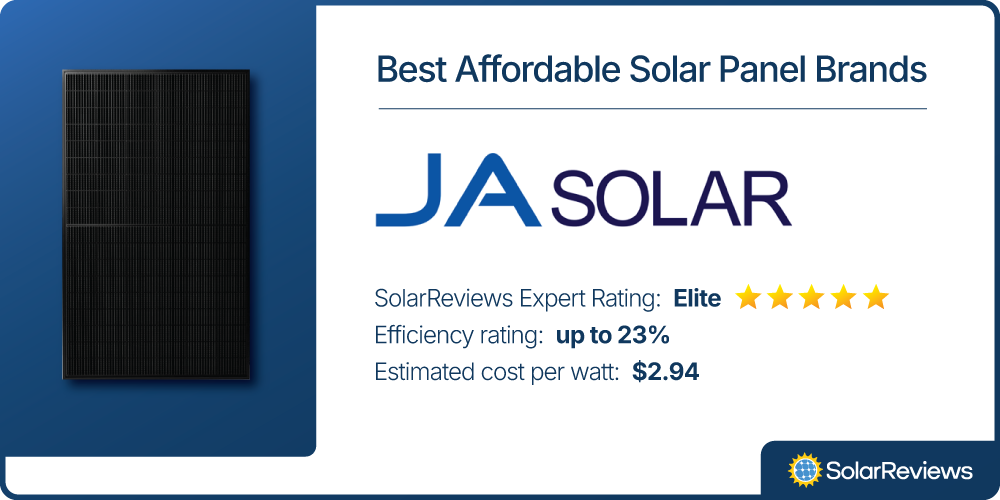
Pros
-
Great efficiency
-
Excellent temperature coefficient
-
Well-known brand
Cons
-
Less commonly offered by installers
Why we chose them: JA Solar not only offers solar panels at a great low value, but its panels are also a perfect example of not sacrificing quality for a lower price. JA Solar has landed on our Best Solar Panel Brands list for two consecutive years thanks to its performance, availability, and reputation.
JA Solar’s newest monocrystalline panels reach up to 23% efficiency, which is great, especially when you consider how budget-friendly they are for home solar panel system installations. With a solid warranty to back up their great performance, JA Solar is one of the best affordable solar brands on the market.
4. Trina Solar: Vertex S TSM-NEO9RC.05
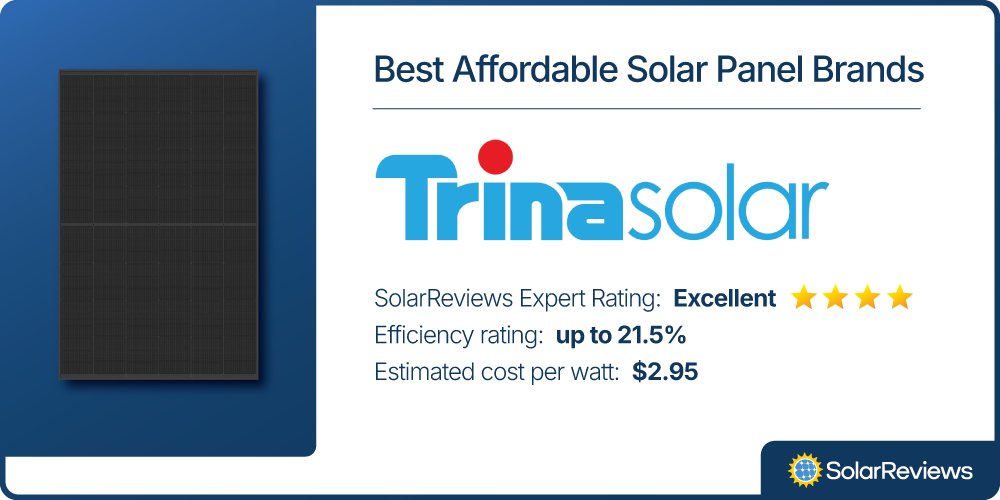
Pros
-
Excellent temperature coefficient
-
Great technology
-
Well-known brand
Cons
-
Lower efficiency than competitors
Why we chose them: Trina Solar is another affordable solar panel brand that has consistently cranked out high-performing solar technology. Trina also appears on our Top Solar Panel Brands list for 2025.
With an efficiency rating up to 21.5%, Trina’s Vertex S 430 watt solar panel falls within industry standard, with some competitors outperforming them. On the positive side, Trina panels have excellent performance scores under PVEL testing, so you can trust that they’ll be a reliable panel for your roof.
5. Mission Solar: MSE PERC 108HC
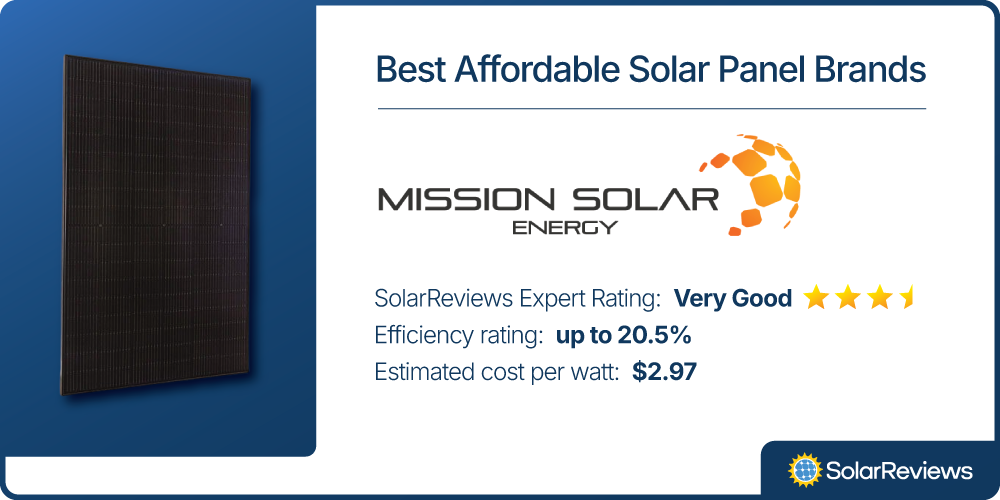
Pros
-
Great warranty
-
High-quality panels
Cons
-
Low SolarReviews rating
-
Higher cost
Why we chose them: Although Mission Solar was not a part of our Top Panel Brands list for 2025, that shouldn’t overshadow the fact that this is a strong company that makes solid solar panels for residential use. These American-made solar panels utilize half-cut cell technology to boost performance.
The panel has a solid 25-year product and performance warranty, but comes with a higher degradation rate than others on this list, promising 84.8% operating efficiency after the warranty period. It also has a slightly lower efficiency rating of 20.5%, but as a whole, Mission is a trustworthy company that offers great solar panels at an excellent value.
It’s also worth noting that Mission’s panels might become an even more affordable option if the Trump Administration institutes new tariffs on imported goods like solar panels and cells. While some of the components that go into Mission’s panels might be impacted, the total cost could be lower than competitors that manufacture overseas.
Cheap solar panels price comparison
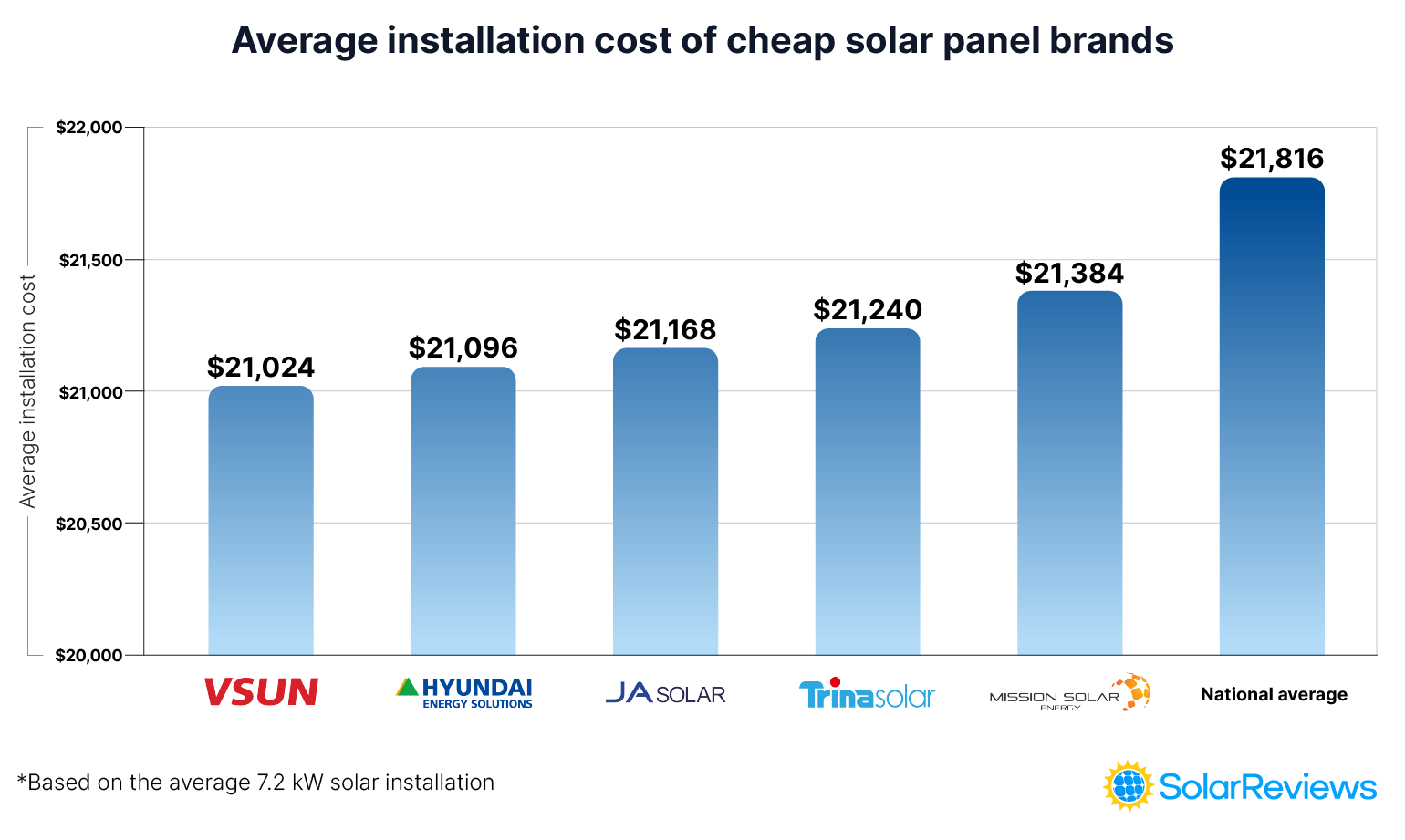
By using the average 7.2 kilowatt (kW) installation, we’re able to come up with estimated installation prices for each brand, before incentives. Using an affordable brand of solar panels like VSUN can save you hundreds of dollars on installation costs on average.
It’s important to realize that even cheap solar panels will still require a substantial upfront investment. Solar panels account for just 12% of a solar installation’s total costs, so even choosing more affordable solar panels only lowers the price by a few hundred dollars.
You could opt for solar panels that are even cheaper than the ones on our list to see bigger savings in upfront costs. There are plenty of lesser-known solar manufacturers that make panels at a lower cost, but we don’t believe the cost savings are worth sacrificing quality.
Installation costs will vary. Factors such as location, how many solar panels you install, and what installation company you use will impact the total price. These installation prices are based on the average solar system size across the country.
Solar panel deals: 7 ways to save money on a solar installation
There are a number of ways you can make going solar more affordable. Here are our expert tips on how to make going solar cheaper without sacrificing quality.
1. Federal solar tax credit
Right now, the best incentive for homeowners who go solar is the federal solar tax credit, which equals 30% of installation costs and reduces what you owe in federal income taxes by thousands of dollars.
The average homeowner will receive a federal tax credit of about $6,500, which directly reduces their income tax liability.
2. Local solar rebates and incentives
Different states, municipalities, or utility companies may offer incentives for going solar that can help reduce solar installation costs. This can come in the form of a tax credit, upfront rebate, or performance-based incentive.
Local incentives are also available to those who install solar battery storage with their installation, and low-income solar programs are also available to help qualifying households go solar for cheap.
3. Take advantage of net metering
Net metering is the utility billing practice that makes solar such a good investment. With net metering, you use the solar energy your panels produce to power your home, and any excess electricity gets sent to the utility grid in exchange for a bill credit. When you use energy from the grid later, those bill credits cover the costs, saving you money!
Through net metering, you can save additional money on your electricity bills and contribute towards a shorter payback period of your solar system. Net metering policies differ depending on state regulations and who your utility provider is. You can learn about your local net metering policy by visiting your utility’s website.
4. Compare solar quotes
Comparing solar quotes is a great way to educate yourself on what you're getting out of a solar installation, but it can also help you get solar panels for around 20% cheaper!
We recommend obtaining at least three solar quotes from local installers to compare the best price for your budget. Looking at fewer solar quotes could mean paying more for a service that another company may be charging less for!
5. Invest in small-scale solar
If you’re interested in solar but aren’t ready to make the leap to a rooftop solar system just yet, consider starting small. There are plenty of portable solar panels and power station options that you can use on the go, in your backyard, or have on hand during a power outage to keep your essentials running.
For example, you can get a small solar generator and solar panel set up for under $1,000 and have it handy to charge your phone when the utility goes down or when you’re on a camping trip. Some specialty RV solar panel kits are designed to power a mobile home, so you can cover more of your power needs when you’re on the road. Even something as simple as a solar-powered phone charger can help keep you charged up on the beach or in your backyard.
These small-scale solar devices let you experience some of the benefits of solar before you dive into a full-blown home solar installation.
6. Buy used solar panels
You can find cheap solar panels from private sellers online that can save you hundreds on solar materials. If you want to invest in solar power, used solar panels can be a solid option for off-grid DIY projects, like a solar-powered greenhouse or a solar gazebo.
We don’t recommend purchasing used solar panels for a rooftop solar installation that powers your whole home. Instead, consider looking into refurbished solar panels; they have been restored to an acceptable working condition and are a more trustworthy option.
7. Community solar
Community solar is a great way to reap the benefits of solar energy without needing an installation. Community solar programs use a subscription model, where customers pay for a portion of their power to come from solar farms.
With no upfront investment or installation necessary for this option, it’s a great option for renters looking to go solar, low-income residents, or those who simply just want to save money on a solar installation.
Are cheap solar panels worth it?
If you plan on choosing a full-service installer for your solar system, you might find there’s only a 5% to 10% price difference between the “cheap” option and the industry standard. Ultimately, it’s up to you to figure out if those savings are worth it to you.
Cheap solar panels can be good quality if you seek out the right brand. When it comes to performance and overall quality, there are plenty of solar panels out there that come at a lower price than the national average but still perform well.
Unsure if a solar panel installation is right for your specific home? Put your information into our solar calculator to learn more about solar costs and savings to make informed decisions.
Affordable solar panels: FAQs
Curious about buying low-cost solar panels and beginning your solar journey? Here are some frequently asked questions you might want to know.
Jamie is a Content Writer and researcher at SolarReviews. A recent graduate of La Salle University in Philadelphia, Jamie earned her B.S. in communications with a concentration in journalism, mass media, and public relations. Jamie has previously worked at a marketing company where she had the opportunity to highlight and promote small business owners through long-form stories and interviews. With a deep-rooted passion for creativity, Jamie stri...
Learn more about Jamie Smith